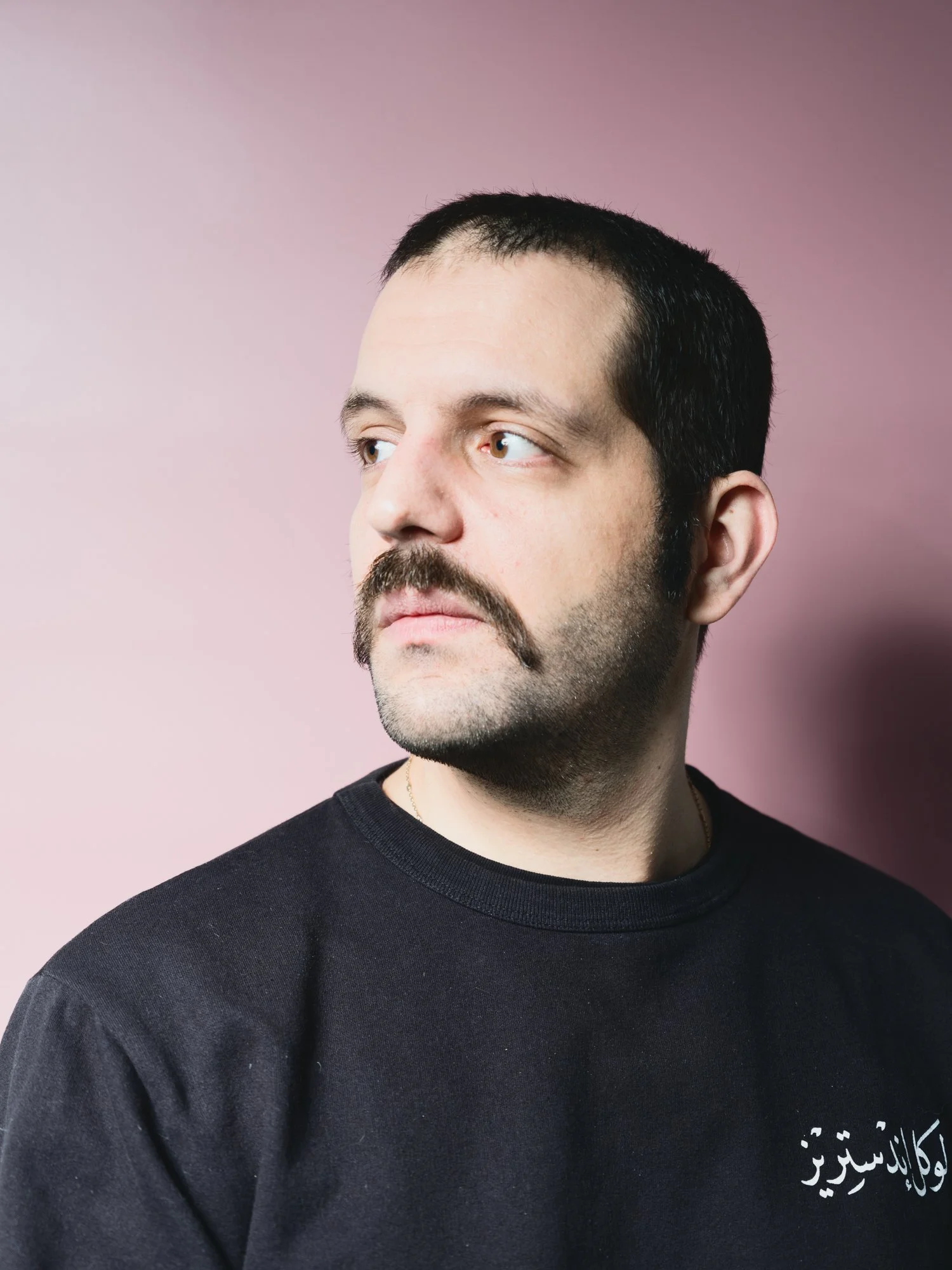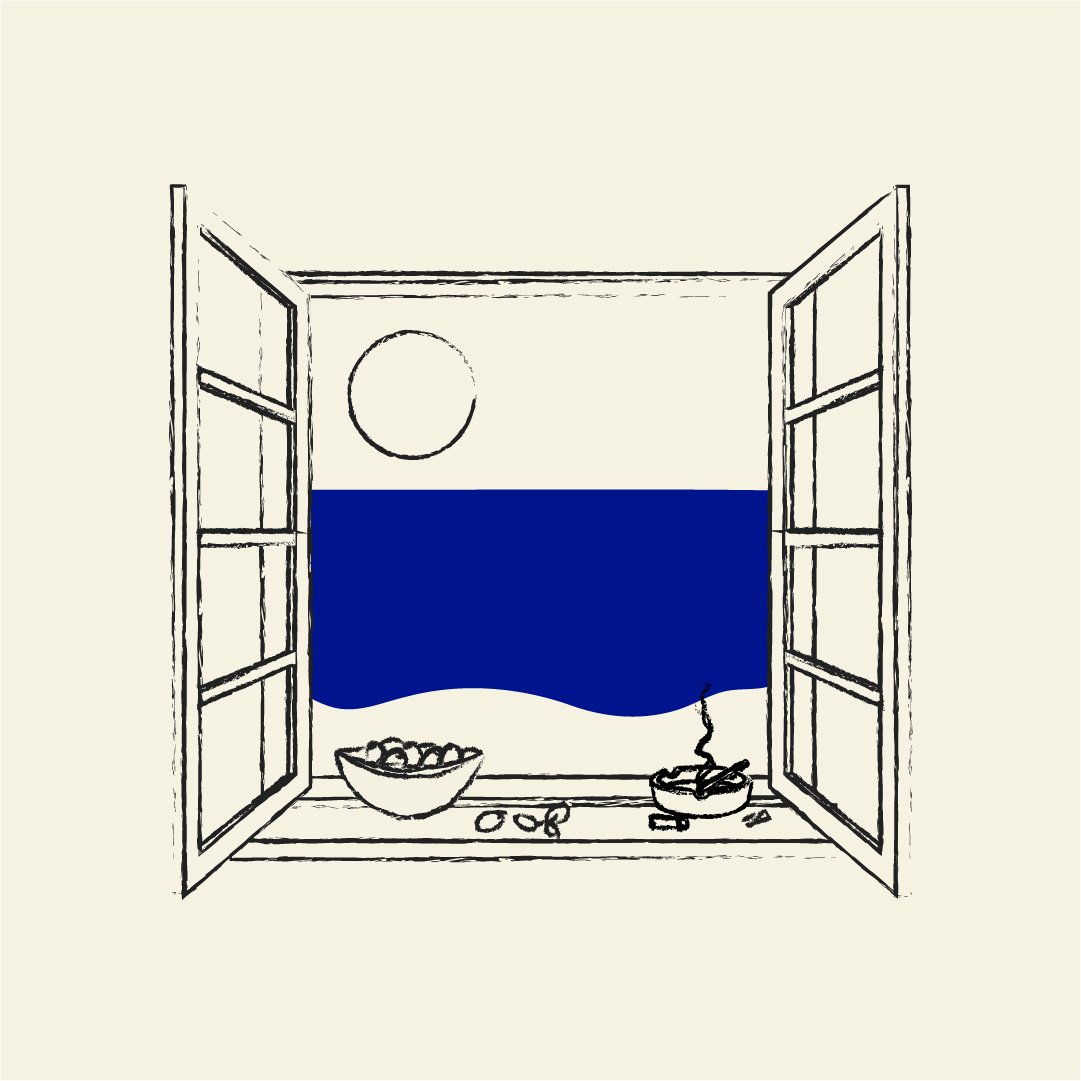Palestinian Literature and the “Recurring Nightmare” of Occupation
AUGUST 19, 2025
The Reporter’s Notebook is our monthly interview series with Dial contributors. To receive these conversations directly in your inbox, sign up for our newsletter.
✺
A conversation with Karim Kattan, whose short story “Burial at Sea” was published in our Fiction issue. A previous story, “Salt Air,” translated from the French by Jeffrey Zuckerman, was published in our Promises issue.
✺
Photograph: Rebecca Topakian
Both “Burial at Sea” and “Salt Air” take place near the sea. Their characters, who are from Palestine, are on vacation, living for a moment outside of time, separate from the people and places that make up their daily lives. The stories explore isolation and exude a sense of claustrophobia. “Burial at Sea,” in particular, includes elements of horror. The genre is useful to explore the “recurring nightmare” of Palestinian occupation, Karim Kattan told Dial deputy editor Esther King. “Horror deals with the fear of violence, maiming, being haunted by things. But even beyond that, it’s articulated around recursive time — you’re always trapped in a time that you can’t get free of.”
THE DIAL: Both of your short stories for The Dial, “Salt Air” and “Burial at Sea,” take place in Gaza before the atrocities we’re witnessing today. You wrote the first in 2016; the second more recently. Is it important to share other narratives — of everyday conflict, ennui, love — about Gaza at a time when so much is being destroyed? How do you think about what it means to publish these stories now?
KARIM KATTAN: I go back and forth on this a lot, my response depends on the day. On some days, it feels important to extract ourselves from the timeline of genocide and reflect, work on, showcase other aspects of our varied lives. Other times it feels indecent.
Two books that I wrote before October 7, 2023 came out afterwards and a question I keep asking myself is: What is the place of literature, given what is happening? What is the meaning of writing a text, of promoting a book?
One of the many things a genocide does is reshape what a culture is — by destroying it and by forcing what has not been destroyed to deal with the destruction. The destruction itself becomes a key component of our lives and histories. So literature, I think, remains very important. Those books are from a specific time, but they are not obsolete.
When we discussed publishing “Burial at Sea,” I really thought, does it even make sense? Is that what someone wants to read from a Palestinian writer today? But I think it maybe does make sense: it’s important to displace the gaze, to have access to other stories, that were written before, that don’t center our destruction but also the other aspects of life — love, envy, dark desires, friendship, ambition, anything that makes up the inner life of humans. But I’m very ambivalent, even as I say that.
Of course, I can say this because I’m speaking to you from the safety of Paris.
THE DIAL: Both stories also involve vacation and the sea in some way. In “Burial at Sea,” a couple having an illicit affair goes on a cruise ship vacation; in “Salt Air,” two co-workers share a hotel room at the beach in Gaza. Could you tell us about that choice? What is it about this set-up that particularly inspires or troubles you?
KK: I want to say it’s accidental, but I guess it’s not, because clearly it’s a pattern. What’s funny is that I don’t even like the sea, I never go to the sea. I’ve never been on a cruise, I get seasick thinking about the sea.
But it’s these floating, buoyant moments that I find interesting, this idea of the vacation as a time that’s extracted from daily life, just like certain love stories are. You have these individuals in a heightened state of freedom and intimacy. That’s always interesting to me, the way people speak when they’re not in their daily life. And there’s the idea of the sea as this oceanic thing that’s much larger than us and the characters. They’re faced with the oceanic, the sublime, a thing that defies language and meaning but they’re also in a moment that’s supposed to be lighthearted. In “Salt Air,” they’re in Gaza but never look at Gaza, they don’t want to see it (and remember this was written before, what they did not want to see was the destruction of the 2014 assault, which seems so minor now). In “Burial at Sea,” the characters are in a place that is built for pleasure and leisure and yet is also the site of the failure of their relationship and, well, something more macabre as well.
These stories are also very much about language and how we speak to each other. One of the threads of “Salt Air” is the character speaking to his mother about language, the feelings of alienation around language. “Burial At Sea” is a bit different: It’s a monologue addressed to someone who cannot respond anymore, so the speaker can finally define the parameters of the story and the relationship.
It’s funny, these stories were written several years apart, one in French and one in English, and it’s very interesting to see them both published in The Dial. It makes me reconsider them. I hadn’t noticed these patterns before. It makes me realize that the more I write the more I’m trying to do the same thing over and over again…
THE DIAL: There’s an element of horror to the story “Burial at Sea” — there’s a touch of madness to the narrator’s voice and we discover halfway half-way through the story that his lover has died during their vacation. Where did this idea come from?
KK: When I wrote it, during the height of COVID, I was living in Bethlehem at my parents’ house. I had this realization that horror as a genre was a bit underutilized to describe the Palestinian experience. Horror deals with the fear of violence, maiming, being haunted by things. But even beyond that, it’s articulated around recursive time — you’re always trapped in a time that you can’t get free of. It’s quite an evocative way to describe the occupation itself, as this recurring nightmare. The occupation organizes your daily life as a constant loop, a trap that you always have to manage but can never break free from. It’s a convincing definition of horror!
There is definitely some madness in the voice of the narrator — it’s also very melodramatic, which I love as a writer. The great thing about fiction is that you can explore these extreme or dark feelings, but you don’t have to comment on them, you don’t have to resolve them. In a way, this story is the dark, twisted version of “Salt Air.”
THE DIAL: The couple we follow in “Salt Air” is also living outside of time and sealed off from the outside world. They work for a development agency and are staying at a beachside hotel to use up the company’s budget in Gaza. They do little else but “go from bed to balcony.” Would you say this idea of disconnection is a through-line in your work?
KK: Yes, I think so. Maybe especially in novels. I love that characters in novels are lost and disconnected and are opaque to themselves. They often don’t understand the world. I like to explore this feeling of alienation. It doesn’t need to be grand, it can be daily. Often, it’s just characters wondering what it is that they’re feeling…
In most things I’ve written until now, I also don’t think much happens. We’re always right before or after the action or, often, removed from it. It happens off the page. So, we’re disconnected from action as well.
THE DIAL: You initially wrote “Salt Air” in French, but you wrote “Burial at Sea” in English. How do you choose which language to use? Is there one that comes more easily or feels like it holds more possibilities?
KK: It depends on what it is that I’m writing. I tend to write short stories in English, because the Anglophone publishing world is much more open to short stories. In France, there’s no interest in it. Sci-fi and fantasy tend to be more English-language genres, so I wrote “Burial At Sea” and other genre-stories in English.
But really, it’s sort of the randomness of life. French is a language that I master completely. I can write and speak in English very well, but I have a certain distance from it. It’s always interesting to write in a language that you don’t know completely. I always like to point out to native English-speakers, because they don’t realize, that English is so amazing at describing movement and qualities of light and sound. It always feels luxurious to me, when I get to do things I can’t in French (which is good at other things!)
The publishing industries also work very differently. Francophone and Anglophone literature don’t really communicate. No one in France ever cares that I publish short stories in English. They don’t care about my stories published in American reviews. I used to be a bit annoyed, that I couldn’t have one cohesive image of what I write because it’s scattered across languages, but now I think it’s very cool. It gives me more freedom.
THE DIAL: You’ve long worked in sci-fi, a genre that is often used to explore utopian ideas. What appeals to you about the genre?
KK: The first answer is aesthetic pleasure. The reason I like it is taste — what I take pleasure in reading and watching. To a certain extent, I love sci-fi because I grew up watching Star Trek and because video games have always been a part of my aesthetic experience of life. But in the same way that horror is evocative of the Palestinian experience, sci-fi gives me access to different ways of exploring who we are and where we’re going. When you’re a Palestinian writer, or a woman or a person writing from a minority situation, you’re always expected to testify to your situation. It can be important, of course, but also reductive — as if we don’t have access to fiction, to imagination.
Sci-fi has a history of whiteness, so it’s also super interesting to use that history to explore that cannon and see what you can make of it. I think I just enjoy upending things like that, just very quietly. You’re just doing your own thing within these broader structures.
But that’s the Karim of 2020. Now, I can’t help but feel self-indulgent.
THE DIAL: Are you rethinking what you want to write about?
KK: Yes, definitely. It’s still very much rooted in the imagination, but my writing is changing. Our writing as Palestinian writers is obviously changing. We’ve always been writing from a prism of darkness but not this monumental darkness. All of this is still moving: The genocide is not over, the situation the country and the region are shifting all the time, so are all our lives, our minds, everything we are and imagine. So until there is some stability, I don’t know if we’ll be able to understand how and to what extent we’ve changed.
THE DIAL: What are you reading right now?
KK: I’m reading Andrew Holleran’s Dancer from the Dance from 1978 — it’s absolutely remarkable. I’ve never read anything like it, the writing is so lush yet irreverent, evocative but harsh and unflinching. It’s something I should have read years ago but somehow didn’t. I feel so lucky that I get to discover it now. There’s a timeliness to things and I think I’m looking also to reconnect with aspects of the history of gay literature I’m less familiar with. Right before that, I read Najla Nakhlé-Cerruti’s book on Palestinian theater and the life of François Abou Salem, the founder of the Hakawati Palestinian National theater, Le Théâtre Palestinien et François About-Salem. It feels important to reconnect and understand the history of our different cultural forms at a moment where a lot of it is under direct threat.





